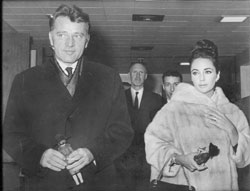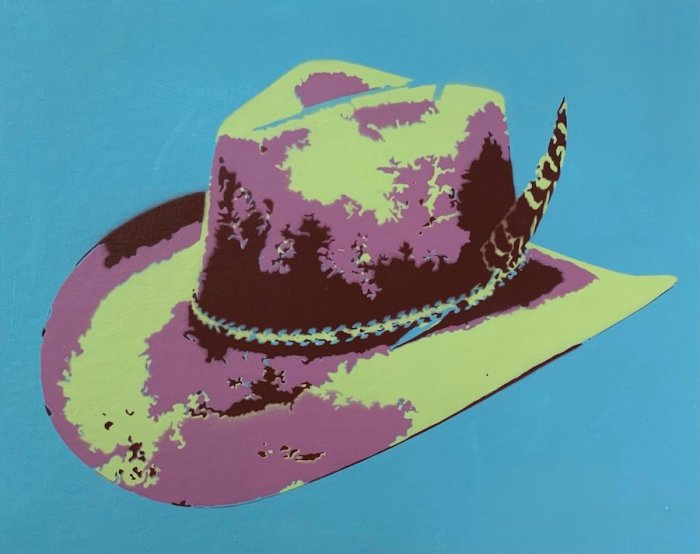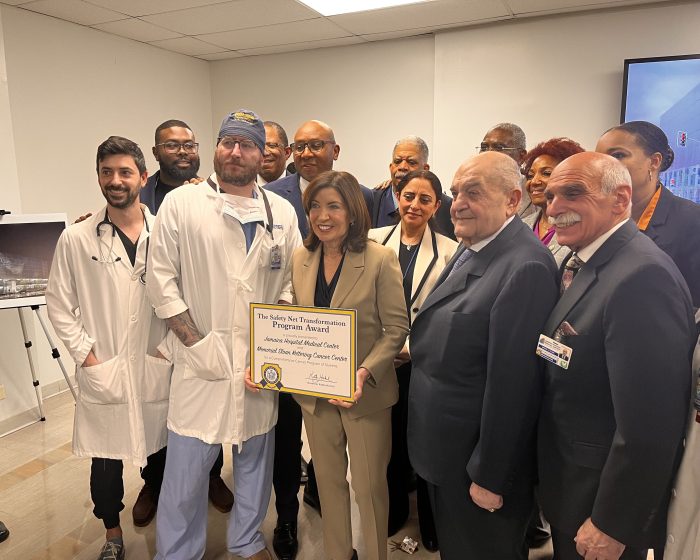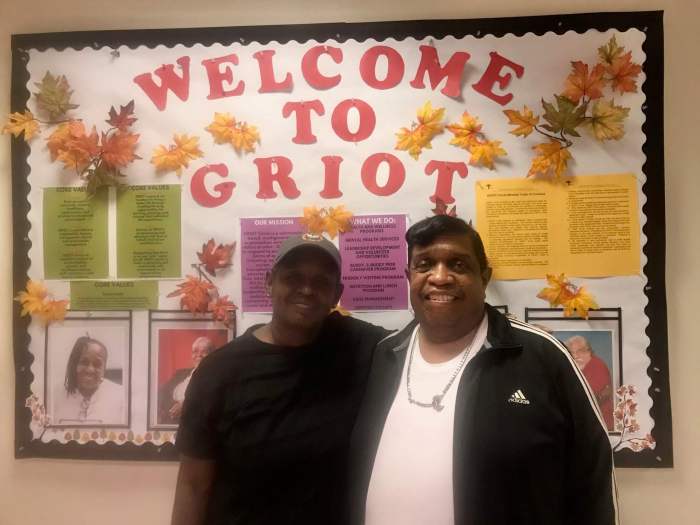By JERRY TALLMER
The Fortune Academy is a residence in what was once a Catholic girls’ school in a huge old building on Riverside Drive at 140th Street. It is a residence for ex-convicts, some 70 of whom—men and women—now have their own small apartments there, as well as a community room, a computer room, books, videos, etc.
“We finally got it open a year ago this month, after years and years and years of doing nothing. To live here you have to be homeless and out of prison less than six months,” says David Rothenberg, who, 36 years ago, founded the Fortune Society, an organization that lends far more than a helping hand to ex-convicts everywhere.
What does any of this have to do with, say, Elizabeth Taylor’s escort on opening night of “Hamlet” in Toronto in 1964, or Peggy Lee in California in the ‘80s singing a Frank Loesser song into a telephone at midnight New York time?
Six degrees of separation, it’s called.
David Rothenberg could tell you, and does, in a few irresistible evenings of his “Namedropping,” up at (and for the benefit of) the Fortune Academy on a couple of Sunday nights, or more. The first one, April 27, sold out instantly. As of this writing, there are still seats available for May 4. If the demand keeps up, so will Rothenberg.
Where to begin? One may as well start with Nathan Cohen, drama editor of the Toronto Star, who late in 1966 or early in 1967 told David, a young man from Teaneck, N.J., then on the rise as a New York theatrical press agent, about a play that he, Cohen, had read. “No one will do it in Canada,” Cohen said. “It needs an American production.”
The play was “Fortune and Men’s Eyes,” by a 40-year-old Toronto man named John Herbert, and it was set in a detention center—in short, a prison—for youthful offenders. The characters—Queeny, Smitty, Rocky, Mona, and the rest—were uncompromisingly real, as was the homosexual rape around which the drama pivoted.
“I read it and I was paralyzed,” says Rothenberg. “I wrote John Herbert a letter, saying I felt I was locked in a room with four cobras. I looked all over New York for a producer, and when no one would touch it, I decided to put it on myself.
“We raised $15,000, and it opened at the Actor’s Playhouse [then and now just below Sheridan Square] on Feb. 23, 1967. If you hadn’t liked it,” says Dave Rothenberg, with reference to a review the next day by this theatergoer, “it would have closed Feb. 25. Norman Nadel in the World-Telegram loathed it. Dan Sullivan in the Times didn’t understand it, dismissed it, called the Queenie played [P.S., brilliantly] by Bill Moor ‘a campy bit part,’ when to me the character was a vicious, mean, tough drag queen.”
This was six years before David Rothenberg, on television, on the David Susskind show, came out. But wait.
“The next week, Michael Smith raved about it in the Village Voice. The play ran for a year at the Actor’s Playhouse, and all over the world, everywhere, for the next 10 years.
“Shortly after it opened, we started doing dialogues with the audience after the show on Tuesday nights. One night a voice from the audience shouted: ‘This play is full of shit!’ From the back of the house came another voice: ‘Not if my 20 years count for anything, and I’ve been in Rikers Island, Dannemora, San Quentin, and on a Florida chain gang.’
“I stood up and said: ‘Come on down,’ and down to the stage came this New York Irish street kid, Pat McGarry, who mesmerized us for an hour. I asked him to come back the next week. He said: ‘You need a black guy. I did white time. There’s white time and black time.’ So the next week he brought along Clarence Cooper, who’d done time in Michigan and was then living as a writer in New York.”
Pat McGarry and Clarence Cooper are dead now, but that was—or soon would be—the beginning of the Fortune Society.
The New York Times, perhaps atoning for, or covering up for, its critique of the show, sent a reporter to one of the Tuesday nights. The story appeared under the headline: “The Drama Continues After Curtain Falls.” Early in 1968, Susskind brought four ex-convicts on camera for a round-table discussion on live television.
“A real breakthrough,” says Rothenberg. “This was 1967, remember, when ex-convicts were totally invisible to the public. The next morning around 250 men showed up at my office, six flights up at 1545 Broadway.
“There were guys standing all the way down the stairway from the sixth floor to the street, they’re all looking for jobs, and here I am in this tiny office with Tennessee Williams posters and ‘Hair’ posters on the wall. These were the days when you got out releases by mimeograph machine. Remember mimeograph machines? —the purple ink on your fingers?
“Finally one big white guy with a toothpick in his mouth said: ‘You don’t know what you’re doing, do you?’ I said: ‘No idea.’ He said: ‘Move over.’ His name was Kenny Jackson, and he became the first counselor of the Fortune Society. Melvin Rivers, from Bed-Stuy, became the second. Kenny, Mel, and I were the key for the next four years, and the kids from ‘Hair’ loved it, Melba Moore and others coming in to help.”
Kenny, Mel, and Dave were also among those called up to Attica, as intermediaries, when that prison blew up in 1971. They went in on a Friday and Saturday. On Monday morning, Nelson Rockefeller’s state troopers started shooting everything in sight…
Signals off. Maybe it is time for a little touch of Peggy in the night. Peggy Lee.
“I worked with her when she was coming here to perform at the Ballroom. She was in California, I was here in my apartment on 13th Street [still Dave’s apartment today], and whenever she needed something, she’d call me. She’d call at 9 o’clock California time, midnight here.
“So this one midnight I’m in bed and the phone rings. It’s Peggy, and she needs some Frank Loesser music. I said: ‘Will you be singing my favorite Frank Loesser song?’ and she says: ‘Do you mean this one?’ and over the phone sings all the way through ‘Spring Will Be a Little Late This Year.’ The best Peggy Lee concert ever heard.”
That’s just one of the many names Dave Rothenberg drops during his “Namedroppings.”
The act, if that’s what it is, began as a consequence of people telling Dave he should write a book. “Oh, please,” was his response. “A show business book? Hasn’t been one published in five minutes.” But he did know one law of life: “When you work in theater, you can dine out on stories—forever.”
Instead of dining out, he’s put them into “Namedropping”: Peggy Lee. Bette Davis. Lauren Bacall. Judy Garland. Tennessee Williams. Charles Laughton and Elsa Lanchester. Al Pacino. Joan Fontaine. Alvin Ailey…
“Alvin Ailey was my first friend in theater. I was working for Max Eisen, who was doing publicity for a summer tour by Abbey Lincoln that was being directed by some kid named Alvin Ailey. He and I got to be pals. One day Alvin very meekly said: ‘I’ve started a dance company. Would you come see a rehearsal?’
“I said to myself, Oh God, but I went over and saw a rehearsal of his ‘Revelations,’ which opened at the Clark Center Y on Eighth Avenue, and it was one of the most exciting experiences of my life. Like John Leguizamo, you know? Up there on the mezzanine of the American Place Theater? You couldn’t believe it was as good as it was.”
In 1962 the world stopped rotating on its axis while an unknown (in the U.S.) Welshman named Richard Burton made a movie called “Cleopatra” with a rather well known English-American woman named Elizabeth Taylor. The next year, Richard Burton went to Mexico to make “Night of the Iguana.” And the next year, 1964, Richard Burton came—by way of Toronto and Boston—to New York and to Broadway’s Lunt-Fontanne Theater in the title role of a play called “Hamlet.”
“You will remember,” says Dave Rothenberg, who had been the advance man on that expedition, “that in 1964 you did not live in public with someone who was not your wife, or husband. It was considered shanda, not nice.”
So there they were—Richard Burton, Elizabeth Taylor, producer Alex Cohen, director John Gielgud, advance man David Rothenberg—at lunch in the dining room of the Prince Edward Hotel, Toronto, on the ground floor, facing the windows, “with all the picketers outside screaming, and 4,000 photographers waiting.”
More than one person over the years has found that there is a warm and genuine Elizabeth Taylor beneath the skin, and Rothenberg is one of them. “She’s bawdy and gaudy and gorgeous and wonderful and so nice, but also isolated. So I was her date opening night at Toronto’s O’Keefe Center.”
On to Boston.
“Ten thousand people are waiting at Logan Airport. I’m already in Boston as advance person. I have all the travel info and the hotel and bus and car and limo reservations. To get away from the crowd, the plane, with all aboard, has to be pulled into a hangar. The cops won’t let anyone through.
“A cop says: ‘Okay, kid, let’s see the papers,’ and rabbit-punches me in the stomach. I’m hauled off to the first-aid room. Robert and Elizabeth can’t get out of the plane. No one knows where to go. Finally someone listens to me in the first-aid room, and I’m put on a scooter and hustled to the plane.
“They still have to get Richard and Elizabeth off. Richard’s understudy Robert Burr is on the plane. He looks a lot like Richard. Robert Burr gets off the plane with 10,000 people following him”—and that’s how “Hamlet” got to open in Boston.
“One final note,” says Rothenberg. “Opening night, one of the spear-carriers comes up to me and says: ‘My friend and I have this play, maybe you could read it.’ Late that night I find myself in a hotel room—some strange little hotel somewhere—and I’m reading this play by this guy and his partner, I have no idea what they’re talking about, their names are Gerri Ragni and James Rado, and the play is called ‘Hair.’”
Cut to 1973.
David Susskind has asked the National Gay Task Force to bring together for a program some mainstream homosexual men and women. Rothenberg is asked to be among them.
“As director of the Fortune Society, I’d won a little attention in justice circles, but I was deeply in the closet. So I polled the executive board of the Fortune Society.
“I said: ‘I have three things to tell you. One, I’m going on Susskind. Two, I’m going to be on television, talking about my homosexuality. Three, I’m prepared to offer my resignation, if you ask for it.
“And after a Pinter pause,” says Rothenberg, who knows a Harold Pinter pause when he sees one. “Kenny Jackson asked: ‘What are you going to wear on television?’ I said: ‘What kind of question is that?’ Kenny said: ‘You dress sloppy. Look right and make us proud of you.’
“Then Mel Rivers said: ‘You’ve stood alongside us for six years. Give us the opportunity to stand alongside you.’ That,” says the David Rothenberg of 2003, “was the most profound political statement of my life.”
Kenny Jackson is dead now. John Herbert died last year. Mel Rivers is alive in Arizona. Dave Rothenberg ran for the New York City Council in 1985—the first openly gay candidate in city history—and almost won; got 46 percent of the vote against popular incumbent Carol Greitzer. (I can tell you where one of the Rothenberg votes came from.) In 1986 he ran for State Committeeman of the Democratic Party, and did win.
But he doesn’t like politics. “Too many compromises. You end up being Wayne Morse. Remember Wayne Morse? Popular with the public, but can’t affect change.”
Dave Rothenberg says he lives by one of his mother’s precepts: “Religion gets in the way of my faith.” His religions—no, his faith—would seem to be theater and decency. The telephone number to call for reservations to “Namedropping” is (212) 255-4834.





































